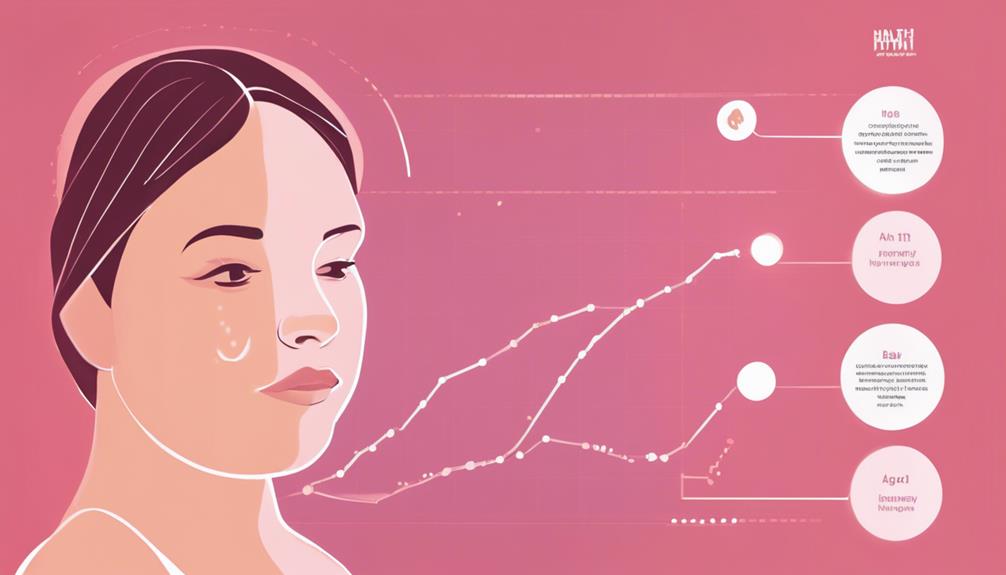How Hormonal Changes Affect Women’s Health & How to Manage Them
You may think hormonal changes are just a normal part of being a woman, but they can significantly impact your health and well-being. Understanding how these fluctuations influence your body is crucial for effectively managing your overall health. From puberty to menopause, hormonal shifts can bring about various challenges that require attention and care. Exploring the ways in which you can navigate these changes and support your body through different stages is essential for maintaining a balanced and healthy life.
Puberty Hormonal Changes
During puberty, your body undergoes significant hormonal changes that play a crucial role in your overall development. These changes impact both your emotional development and physical changes, shaping you into the person you're becoming. Emotionally, you may experience mood swings, heightened sensitivity, and new feelings as your hormones fluctuate. It's normal to feel overwhelmed or confused during this time, but remember that these changes are a natural part of growing up.
Physically, you'll notice transformations like breast development, growth spurts, and changes in body shape. Your skin may become oilier, and you might start experiencing acne. These physical changes can sometimes affect your self-esteem, but it's important to remember that everyone goes through puberty at their own pace.
Navigating puberty can be challenging, but it's a vital stage in your journey towards adulthood. Remember to be patient with yourself and seek support from trusted individuals as you navigate these hormonal changes.
Menstrual Cycle Effects
Have you ever wondered how the hormonal changes during your menstrual cycle can affect your overall well-being? Hormonal fluctuations throughout your menstrual cycle can have a significant impact on your emotional well-being. As estrogen and progesterone levels rise and fall, you may experience emotional changes such as mood swings, irritability, anxiety, or even depression. These fluctuations can affect your energy levels, motivation, and how you perceive and react to situations.
During the first half of your cycle, estrogen levels rise, leading to feelings of optimism and increased energy. As ovulation approaches, estrogen peaks, and you may feel more outgoing and confident. However, after ovulation, progesterone levels rise, which can sometimes cause mood swings and irritability.
Closer to your period, as hormone levels drop, you might experience fatigue, sadness, or heightened emotions.
Understanding these hormonal effects can help you better manage your emotional well-being throughout your menstrual cycle. Prioritizing self-care, maintaining a healthy lifestyle, and seeking support when needed can all contribute to a smoother emotional experience during this time.
Pregnancy Hormone Impact
Pregnancy brings about a multitude of hormonal changes that play a crucial role in supporting the development and sustenance of a growing life within you. During pregnancy, your body experiences significant fertility fluctuations as hormones like estrogen and progesterone work together to create a nurturing environment for the fetus. These hormonal shifts not only impact your ability to conceive but also regulate your emotional well-being throughout the different stages of pregnancy.
As your body adjusts to the influx of pregnancy hormones, you may notice changes in your mood, energy levels, and overall emotional regulation. It's common to experience heightened emotions, such as mood swings or increased sensitivity, as your body adapts to the hormonal changes necessary for sustaining a healthy pregnancy.
Understanding these fluctuations and their impact on your emotional state can help you navigate the ups and downs of pregnancy with greater ease and self-awareness. Remember, it's normal to experience these emotional changes, and seeking support from loved ones or healthcare providers can be beneficial during this transformative time.
Perimenopause Symptoms
Navigating the phase of perimenopause can bring a range of symptoms that may impact your daily life and well-being. Hormonal fluctuations during perimenopause can lead to physical and emotional changes.
You may experience irregular periods, hot flashes, night sweats, mood swings, fatigue, and changes in libido. These symptoms are a result of your body's struggle to regulate hormone levels as you transition towards menopause. Hormone regulation becomes challenging during perimenopause, causing shifts that can disrupt your usual routine.
It's essential to listen to your body and seek support if these symptoms become overwhelming. Simple lifestyle changes like regular exercise, a balanced diet, stress management techniques, and getting enough sleep can help alleviate some of these symptoms.
Menopause Health Challenges
As women transition through menopause, they may encounter various health challenges that stem from hormonal shifts in the body. Hormone replacement therapy is a common approach to managing menopause symptoms, such as hot flashes, mood swings, and vaginal dryness. These hormonal changes can also lead to increased risk of osteoporosis and heart disease, making regular check-ups and screenings crucial during this phase of life.
Menopause management involves not only addressing physical symptoms but also emotional well-being. Many women experience feelings of sadness, anxiety, or loss during menopause, and seeking support from healthcare providers or therapists can be beneficial.
Additionally, maintaining a healthy lifestyle through regular exercise, balanced nutrition, and stress-reducing activities can help alleviate some of the challenges faced during menopause.
Hormonal Imbalance Signs
During certain phases of life, such as menopause or times of heightened stress, women may experience signs of hormonal imbalance. Hormonal acne, characterized by breakouts around the chin and jawline, can be a frustrating symptom of hormonal fluctuations. These flare-ups can impact your self-esteem and confidence, but understanding the hormonal triggers can help you manage this issue effectively.
Weight fluctuations are another common sign of hormonal imbalance that many women experience. You may notice sudden changes in your weight, even without significant alterations in your diet or exercise routine. This can be distressing and challenging to navigate, but remember that hormonal imbalances can play a significant role in these fluctuations.
If you find yourself struggling with hormonal acne or unexplained weight changes, it's essential to seek support from healthcare professionals who can provide guidance and personalized solutions to help you rebalance your hormones and improve your overall well-being. Remember, you're not alone in this journey, and with the right support, you can manage these signs of hormonal imbalance effectively.
Managing PMS Naturally
If you've been dealing with hormonal imbalances affecting your well-being, you may also find yourself struggling with managing premenstrual syndrome (PMS) naturally. When PMS symptoms strike, turning to herbal remedies and mind-body techniques can provide relief in a gentle and holistic way. Here are some strategies to help you manage PMS naturally:
| Herbal Remedies | Mind-Body Techniques | Benefits |
|---|---|---|
| Chasteberry | Meditation | Hormonal balance and relaxation |
| Evening Primrose Oil | Yoga | Reduced mood swings and stress |
| Ginger | Deep breathing exercises | Alleviation of bloating and cramps |
Incorporating these herbal remedies like chasteberry and ginger can help regulate hormone levels and ease physical discomfort. Additionally, practicing mind-body techniques such as meditation and yoga can contribute to emotional well-being and stress reduction. By combining these natural approaches, you can empower yourself to navigate through PMS with greater ease and comfort.
Hormone Replacement Therapy
Opting for Hormone Replacement Therapy (HRT) can be a significant decision for women experiencing hormonal imbalances. When considering HRT, it's essential to understand how this therapy can impact hormone regulation and levels in your body. Here are some key points to keep in mind:
- Individualized Approach: HRT should be tailored to your specific needs, taking into account your unique hormone levels and health goals.
- Monitoring: Regular monitoring of hormone levels is crucial to ensure the therapy is effectively balancing your hormones.
- Potential Risks: Discuss the potential risks and benefits of HRT with your healthcare provider to make an informed decision.
- Types of HRT: There are various types of HRT available, including pills, patches, creams, and injections. Your healthcare provider will help determine the most suitable option for you.
- Long-Term Plan: Develop a long-term plan with your healthcare provider to manage hormone levels effectively and address any changes that may occur over time.
Lifestyle Changes for Hormonal Health
To maintain optimal hormonal health, incorporating lifestyle changes can play a pivotal role in supporting your body's natural balance. Making dietary adjustments is a key factor in regulating hormones. Include adequate amounts of whole foods like fruits, vegetables, lean proteins, and healthy fats in your diet. These nutrients can help stabilize blood sugar levels and support hormone production. Additionally, reducing processed foods, sugars, and caffeine can aid in hormonal balance.
Stress management is another crucial aspect of maintaining hormonal health. High stress levels can disrupt hormone levels, leading to imbalances. Incorporate stress-reducing activities such as meditation, yoga, deep breathing exercises, or spending time in nature. Prioritizing self-care and setting boundaries can also help manage stress levels effectively.
Frequently Asked Questions
Can Hormonal Changes Affect My Mood Swings and Emotional Well-Being?
Hormonal changes can indeed impact your mood swings and emotional well-being. Understanding these fluctuations is crucial for stress management and maintaining good mental health. Finding ways to support yourself during these times is essential.
How Do Hormonal Fluctuations Impact My Skin Health and Appearance?
Hormonal fluctuations during your menstrual cycle can trigger hormonal acne, affecting your skin health and appearance. Understanding these changes and maintaining a consistent skincare routine tailored to your skin type can help manage these effects effectively.
Are There Any Specific Hormonal Changes That Can Affect My Libido?
When your hormonal balance shifts during the menstrual cycle or due to pregnancy hormones, it can impact your libido. Understanding these fluctuations and communicating with your healthcare provider can help manage these changes for a healthier intimate life.
Can Hormonal Imbalances Lead to Weight Gain or Difficulty Losing Weight?
When your body's hormones get out of sync, it can mess with your metabolism, making weight gain a common struggle. Balancing hormones through proper diet, exercise routines, and seeking medical advice can help manage these imbalances effectively.
How Do Hormonal Changes During Menopause Affect Bone Density and Risk of Osteoporosis?
Hormonal regulation during menopause impacts bone health by decreasing estrogen levels, leading to reduced bone density and increased risk of osteoporosis. Managing this involves a balanced diet, weight-bearing exercises, and possibly hormone therapy for bone protection.
Conclusion
In conclusion, navigating the twists and turns of hormonal changes can be a challenging journey for women. By embracing lifestyle adjustments, seeking guidance from healthcare providers, and exploring hormone replacement therapy options, you can conquer these hormonal hurdles with grace and grit. Remember, balance is key in battling the bothersome symptoms and blossoming into a harmonious, healthy version of yourself. Stay strong, stay informed, and stay radiant on your hormonal health quest!













